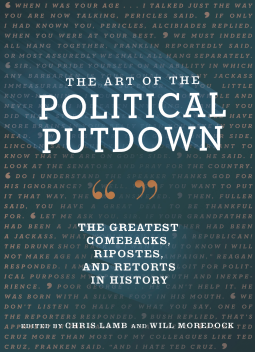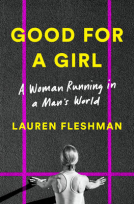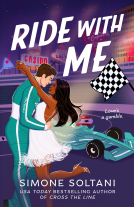
The Art of the Political Putdown
The Greatest Comebacks, Ripostes, and Retorts in History
by Chris Lamb; Will Moredock
This title was previously available on NetGalley and is now archived.
Send NetGalley books directly to your Kindle or Kindle app
1
To read on a Kindle or Kindle app, please add kindle@netgalley.com as an approved email address to receive files in your Amazon account. Click here for step-by-step instructions.
2
Also find your Kindle email address within your Amazon account, and enter it here.
Pub Date Apr 07 2020 | Archive Date Nov 16 2020
Talking about this book? Use #TheArtofthePoliticalPutdown #NetGalley. More hashtag tips!
Description
Liberal or conservative, humor can be a powerful weapon in any politician's arsenal, and political journalists Chris Lamb and Will Moredock have seen their fair share of quips, witty remarks, and sarcastic pleasantries.
In mining the past few thousand years of political history, they've unearthed a treasure trove of humorous exchanges, from ancient Rome to modern day, to compile this collection of hilarious comebacks and putdowns.
• Features 11 brief essays analyzing the use of humor and wit in various political contexts
• Even-handed, intelligent, and lighthearted political humor that gives readers from the Left and the Right something to laugh about
The Art of the Political Putdown is filled with famous and lesser-known politicians at their sassiest, along with short essays.
This is a comprehensive, nonpartisan collection of witticisms, scathing burns, and mic-drop-worthy insults throughout history.
• A rare political humor book with something for everyone, and a welcome reminder that politics can also be a source of laughter
• Perfect as a gift for politics and history buffs and for anyone who appreciates smart humor and top-notch wit
• Great for those who loved Whose Boat Is This Boat?: Comments That Don't Help in the Aftermath of a Hurricane by the Staff of The Late Show with Stephen Colbert, Shade: A Tale of Two Presidents by Pete Souza, and The Wit & Wisdom of Winston Churchill by James C. Humes
Available Editions
| EDITION | Other Format |
| ISBN | 9781452183855 |
| PRICE | $16.95 (USD) |
| PAGES | 224 |
Featured Reviews
 David W, Media/Journalist
David W, Media/Journalist
Growing up in Canada, with a lot of British influence, I became accustomed to the impressive verbal fencing that parliamentary systems seem to promote. The idea is to skewer the opponent while leaving them standing and while everyone else gets a good laugh. Think Oscar Wilde in the House of Commons. There are several tactics to achieve this, including reversals, wrong choice, self-deprecation, and damning with faint praise (my own favorite).
The Art of the Political Putdown is a small collection of gems of varying quality, employing these tactics, usually without naming them. So it is not prescriptive or educational. It is merely enjoyable. And mostly American, though Winston Churchill features repeatedly. On the American side, Abraham Lincoln is the most quotable. If not for finding humor in everything, he said he would die. Chris Lamb and Will Moredock have collected some good ones, but they aren’t really about the Art of it as the title suggests. There is no “You see what he did there?”
The trick, which the authors don’t go into, is listening. By carefully listening, a politician can flip a word, phrase or idea back on its speaker, using associations learned over years of on the job practice. Comedians do this when they work an audience. Politicians can stop someone else’s career with a well-structured rejoinder, so that they are only ever remembered for the remark at that one encounter. A mild example (not in the book) of foolishly offering a choice is George Bernard Shaw’s conversation with a fawning woman who marveled at what a wonderful being she and Shaw could have produced together, what with his brains and her looks. Shaw shot back: But what if it had your brains and my looks?
There are numerous famous quips, such as Pablo Picasso’s confrontation with the Gestapo in Paris. They discovered his gigantic Guernica – too big to move or store - and confronted him over it. “You did this?’ the officer accused him. “No, you did,” he was supposed to have replied.
In reading them, I noticed several I recognized from the likes of WC Fields several decades earlier. They are nonetheless attributed to more recent politicians. Can’t change that. If the internet has taught anything, it is that theft is acceptable.
A couple of things I did not like are 1) repetition. There are several stories repeated twice, and one three times, in a book with just 300 examples of great repartee. 2), the book degenerates into modern American politics – the Trump era of no sense of humor – where attacks are not so much artful as crude. There is no art in calling a senator Lyin’ Ted Cruz, utter garbage, a puppet, or any of the other innumerable, forgettable accusations that pass for creative putdowns today.
I leave you with a classic I first heard from John McCain (also not in the book) to the effect that politicians are like diapers. Both need to be changed often, and for precisely the same reason.
David Wineberg
Readers who liked this book also liked:
Jodi Picoult; Jennifer Finney Boylan
General Fiction (Adult), Literary Fiction, Women's Fiction


















